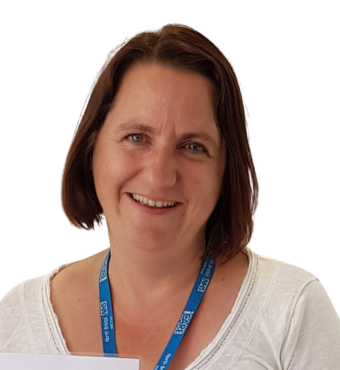
Alison Jenkins is a Research Nurse for the Renal team at North Bristol NHS Trust. As well as managing research studies, she is also a young adult support worker for renal patients.
Alison explains how she enjoys the variety her two roles offer, and how she uses her clinical knowledge all the time in her role.
Day to day my role involves managing eight studies
I’ve worked in the NHS since 1986 and I joined the Renal research team in 2017. The studies I mainly focus on are for dialysis or transplant patients. Some of the studies are interventional – evaluating the direct impacts of treatment or preventive measures on disease. Other studies are observational – often retrospective studies used to assess potential causes in exposure-outcome relationships, which can then influence preventive methods.
“I’ve seen some of my patients regularly for two years and we are very much seen as the patient’s advocate about their holistic care, often referring them to other members of the multi-disciplinary team.”
No two days are the same
I am lucky that I have a lot of variety in my work. Depending on which study I am working on, I may need to see a patient off site at one of the dialysis units. I enjoy visiting my patients. I’ve seen some of them regularly for two years and we are very much seen as the patient’s advocate about their holistic care, often referring them to other members of the multi-disciplinary team.
I have two roles, both of which I love
I am also a young adult support worker for renal patients aged between 16 and 25. We hold a transition clinic and a young adult clinic which we run four times a year, specifically for people under the age of 30. In the transition clinic, patients are often moving from Bristol Children’s hospital and are adapting to being an adult and having a chronic illness. These patients need a fair bit of support with different aspects around their condition.
We also see young patients who are pre-dialysis, on dialysis and post-transplant. The clinic is there to give them extra support because it can be really daunting. Often when I am on a research visit at one of the dialysis units, I can also check on any young people who are on dialysis at that time to see if they need any extra support.
I got interested in research was when I was working in Renal Outpatients
This was 2015. I was asked to perform a specific test for a research study, and it made me curious. I decided I wanted to learn more about the research that takes place for our renal patients, so I found out there was going to be a dialysis study and a post-transplant study, which if I joined the renal research team I would be able to support. Our patients ask lots of questions, and when you are in a clinical role you can’t always answer them because you don’t have enough understanding of ongoing studies, their aims and purposes. So, working in research has really expanded my knowledge.
Studies I’m working on
I am currently recruiting patients to several dialysis studies, including various drug studies, and also an observational study regarding improving access to kidney transplantation.
The renal research portfolio changes frequently as some studies are only run for a brief follow up period. The studies are really varied and I can often work on several study visits for different studies in the same day.
I believe it is really important for patients to be aware of studies that they may be eligible to participate in.
What key things did you need to know when you first joined research?
I needed to complete Good Clinical Practice (GCP) training and get to grips with a lot of the procedures. Research was different from anything I had ever done before. There are a lot of new acronyms! I also needed to learn about Informed Consent and how Ethics works.
I use my clinical knowledge in this role all the time
While I’m seeing my research patients, they often ask me questions about transplant lists or dialysis. Because of my background I have enough clinical knowledge to be able to answer their questions. And if it’s something I don’t have the answer for, I have a lot of contacts within the renal unit, so I can usually find someone to ask.
What would you say to anyone who was thinking about joining a research team?
If someone wants to try working in research, they should really give it a go! I would always encourage people to try it because it can be so beneficial for patients, as well as an interesting area to work in. But I would say that you probably need to have some clinical knowledge about a particular area. If you were to come into a research team with no knowledge of that specialty, it might be tricky.
It can take some time to get used to the different ways of working that research brings, so be realistic and give it at least a year to find out if it’s for you, as there’s a steep learning curve in the beginning. It suits a lot of people if they’re flexible and organised. I enjoy working in an autonomous role and establishing good relationships with the renal participants in my studies.
Further information
- Careers in research and current vacancies at North Bristol NHS Trust
- Support for your research journey
- Our Current Research
